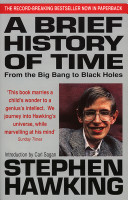Big Bang Does Not Preclude a Creator
Hubble's observations suggested that there was a time, called the big bang, when the universe was infinitesimally small and infinitely dense. Under such conditions all the laws of science, and therefore all ability to predict the future, would break down. If there were events earlier than this time, then they could not affect what happens at the present time. Their existence can be ignored because it would have no observational consequences. One may say that time had a beginning at the big bang, in the sense that earlier times simply would not be defined. It should be emphasized that this beginning in time is very different from those that had been considered previously. In an unchanging universe a beginning in time is something that has to be imposed by some being outside the universe; there is no physical necessity for a beginning. One can imagine that God created the universe at literally any time in the past. On the other hand, if the universe is expanding, there may be physical reasons why there had to be a beginning. One could still imagine that God created the universe at the instant of the big bang, or even afterwards in just such a way as to make it look as though there had been a big bang, but it would be meaningless to suppose that it was created before the big bang. An expanding universe does not preclude a creator, but it does place limits on when he might have carried out his job!
Notes:
But sets limits on when it did the creating.
Folksonomies: creation origins big bang
Taxonomies:
/science/physics (0.590644)
/science (0.442901)
/science/phyiscs/atomic physics (0.318247)
Keywords:
big bang (0.906642 (negative:-0.553574)), time (0.694032 (positive:0.246461)), universe (0.641123 (positive:0.268336)), beginning (0.610725 (negative:-0.069288)), observational consequences (0.547636 (negative:-0.629724)), earlier times (0.534993 (neutral:0.000000)), physical necessity (0.524527 (negative:-0.274534)), unchanging universe (0.522143 (neutral:0.000000)), present time (0.518556 (neutral:0.000000)), physical reasons (0.517144 (neutral:0.000000)), limits (0.476857 (neutral:0.000000)), creator (0.472208 (neutral:0.000000)), God (0.461578 (neutral:0.000000)), Hubble (0.438269 (positive:0.287677)), observations (0.434484 (positive:0.287677)), creating (0.434131 (neutral:0.000000)), existence (0.433224 (negative:-0.629724)), conditions (0.431552 (negative:-0.512968)), laws (0.431517 (negative:-0.512968)), science (0.431494 (negative:-0.512968)), future (0.431391 (negative:-0.602711)), events (0.431357 (neutral:0.000000)), ability (0.431061 (negative:-0.602711)), sense (0.430598 (neutral:0.000000)), instant (0.429147 (neutral:0.000000)), way (0.428781 (neutral:0.000000)), past (0.428688 (neutral:0.000000))
Entities:
Hubble:Person (0.829741 (positive:0.287677))
Concepts:
Time (0.952815): dbpedia | freebase | opencyc
Future (0.808539): dbpedia | freebase
Universe (0.715299): dbpedia | freebase
Present (0.714316): dbpedia | freebase | opencyc
General relativity (0.712502): dbpedia | freebase | opencyc
Big Bang (0.712242): dbpedia | freebase | opencyc | yago
Redshift (0.640561): dbpedia | freebase
Past (0.607204): dbpedia | freebase





